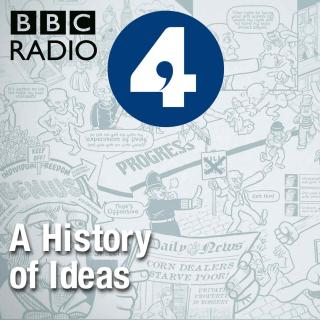
Classicist Edith Hall on Aristophanes in Plato
In 416BC the Greek playwright Aristophanes went to a drinking party. The guests included many famous Athenians, including Socrates, and all of them delivered a speech about love. Aristophanes' speech, says presenter Edith Hall, is 'quite simply the most charming account of why humans need a love partner, another half, in world literature.' In the beginning, he says, humans had two bodies - four legs, four arms. These early humans wheeled around the planet doing cartwheels and were blissfully happy. Then they offended the gods who split them in two. This explains why we are always looking for our other half. This speech appears in Plato's Symposium. Edith's programme also features matchmaker Mary Balfour who shares some of her own experience about the search for love; while Edith explains her belief that the absence of love begins with the primal separation of mother and child.
28 Juli 201513min

What Is Love?
A history of ideas. Presented by Melvyn Bragg but told in many voices.Each week Melvyn is joined by four guests with different backgrounds to discuss a really big question. This week he's asking 'What is Love?'.Helping him answer it are theologian Giles Fraser, writer Lisa Appignanesi, classicist Edith Hall and psychotherapist Mark Vernon.For the rest of the week Giles, Lisa, Edith and Mark will take us further into the history of ideas about love with programmes of their own. Between them they will examine Freud's ideas on erotic love, Jesus and altruism, the first guidance on how to be a loving parent, by Rousseau and Aristophanes' speech which explains how love was born.Producer: Melvin Rickarby.
27 Juli 201512min

Philosopher Timothy Secret on Ancestor Worship
If we're to live well together we must first learn to live well with the dead, says Timothy Secret.At traditional Chinese funerals money, and sometimes paper effigies of goods like washing machines and aeroplanes are burned so that the dead might be adequately equipped in the afterlife. To the Western onlooker this can feel strange but Timothy Secret believes we have something to learn.For Confucius, the Chinese teacher and thinker, respect for and obedience to your parents is one of the most important rules to follow in life and Frances Wood, an expert in Chinese history and society explains why this applies even after their death: observing proper mourning rituals and then honouring your ancestors through twice yearly grave tending.Darian Leader, a psychoanalyst, sets out how Western attitudes towards mourning and the dead have become disrupted veering between the two extremes of determined "closure" and "moving on" on the one hand and excessive obsession with the dead on the other.Producer: Natalie Steed.
24 Juli 201513min

Philosopher Angie Hobbs on Plato's Philosopher Kings
Professor Angie Hobbs asks if the key to harmonious living could be found in Plato's Republic where he proposes that the ideal state be run by philosophers and not by those who seek power for their own ends.Producer: Maggie Ayre.
23 Juli 201513min

Economist Kate Barker on the Free Market
Is a Free Market the vital foundation of a fair, dynamic and creative society? The father of economics, Adam Smith certainly thought so. Since the publication of 'The Wealth of Nations' in 1776 Smith's thoughts on trade and money-making have come to be seen as the theoretical foundations of a rational and rather uncaring form of pure capitalism.Economist, Dame Kate Barker is keen to put the soul back into Smith, revealing the staunch moral principles that underlined his view of a fair and just capitalist society. She wants to measure today's markets against the standards set by the sage of the Scottish Enlightenment. Would Britain's markets in groceries, homes or financial services bring a smile to Smith's stern visage? Kate is joined in her quest by Smith's latest biographer Jesse Norman, by housing market analyst Yolande Barnes and by Christine Tacon, the government's grocery market regulator.This is part of a week of programmes examining how we should live together.
22 Juli 201512min

Historian Justin Champion on Toleration
Professor Justin Champion examines Locke's theory of Toleration through the inhabitants of Spitalfields past and present. He goes to Brick Lane whose famous mosque was built as a Huguenot Church and became a synagogue before becoming the centre of Bengali life in London. He meets the Bishop of London, himself of Huguenot descent and local politician Abdal Ullah to discuss religious tolerance then and nowProducer: Maggie Ayre.
21 Juli 201513min

How Should We Live Together?
A history of ideas. Presented by Melvyn Bragg but told in many voices. Each week Melvyn is joined by four guests with different backgrounds to discuss a really big question. This week he's asking 'How should we live together?'. Helping him answer it are economist Kate Barker, historian Justin Champion and the philosophers Timothy Secret and Angie Hobbs.For the rest of the week Kate, Justin, Timothy and Angie will take us further into the history of ideas around this question with programmes of their own. Between them they will examine: Adam Smith's idea of the free market; John Locke's prescription for cohesion in a diverse society - Toleration; ideas of ancestor worship as practiced by followers of Confucius; and Plato's idea of the Philosopher Kings - government by the wise. Producer: Melvin Rickarby.
20 Juli 201512min

Philosopher Barry Smith on Descartes and Consciousness
Rene Descartes, one of the most influential philosophers ever, thought the mind was like an open book that could be read by the light of reason. So there was nothing that we could not access or examine in our own minds. In fact Descartes argued that consciousness was the mind - there was nothing beyond it. Now we see the mind as a labyrinthine cellar full of bric-a-brac and untapped rooms of which consciousness is merely one - and a small one at that. Barry Smith charts this change and explains some of the contemporary thinking about consciousness.
17 Apr 201512min




















